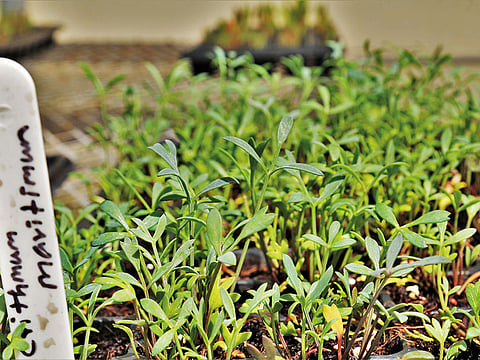Halophytic vegetables catch on in the UAE
First time vegetables are being grown using reject brine from desalination units

Dubai: Scientists at the International Center for Biosaline Agriculture (ICBA) have successfully started growing halophytic (salt-loving) vegetables in the UAE conditions, using reject brine from desalination units treated with fish effluents.
It is the first time that halophytic vegetables are being grown in the UAE conditions, both in the open field conditions and a simple net-house structure, without using fresh water.
The idea behind the research is to save fresh water and introduce these vegetables into the local diet, eventually contributing towards sustainable future food security of the country.
As a pilot study, the centre is currently growing six halophytic vegetables at its experimental station in Dubai. The vegetables include Salsola soda (agretti); Crithmum maritimum (rock samphire); Beta maritima (sea beet); Aster tripolium (sea aster); Salicornia bigelovii (samphire); and Portulaca oleracea (common purslane).
The vegetables are currently being tested using the reject brine from desalination that goes through the aquaculture system making use of the water enriched in nutrients.
Dr Dionysia Angeliki Lyra, a halophyte agronomist at ICBA, who leads the research said: “We are very happy to grow halophytic vegetables in the UAE conditions and the initial results are very promising. In addition to saving fresh water and utilising reject brine for vegetable production in the country, our focus on halophytic vegetables is based on scientific studies which demonstrate that these vegetables are very rich in antioxidants, fatty acids, vitamins and other vital elements essential for the human health. Some of them have pharmaceutical and medicinal properties. For example, purslane is the richest plant source in alpha-Linolenic acid one of the two essential fatty acids necessary for health that cannot be produced within the human body, and therefore must be acquired through a diet.”
The research on halophytic vegetables is one of the components of a project titled “Inland and coastal modular farms for climate change adaptation in desert environments”. The project is supported by the Expo 2020 Dubai’s Expo Live Innovation Impact Grant Programme.
The overall goal of the project is to produce crops in degraded or barren land with economic benefits for the local communities. The project helps in developing and optimising inland and coastal multi-component farms using marginal saline water resources to grow unconventional crops so as to enhance food, nutrition and income security of farmers who face challenges in producing crops in hot and dry environments.
The target is to develop climate-resilient, biodiverse, affordable, easy-to-operate, nutrient-dense farming schemes that increase food and nutrition security in salt-affected areas, desert environments, marginal lands, while providing multifold incomes to farmers.
ICBA researchers can now develop integrated farming solutions tailor-made for any specific area taking into account its climatic, soil and socioeconomic characteristics.
As part of the project, the centre is also working with Chef Doxis Bekris, one of the famous chefs in the UAE, to develop recipes using halophytic vegetables.



